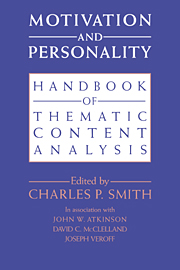Book contents
- Frontmatter
- Contents
- List of contributors
- Preface
- Acknowledgments
- 1 Introduction: inferences from verbal material
- PART I GENERAL ISSUES
- PART II CONTENT ANALYSIS SYSTEMS
- 9 The achievement motive
- 10 A scoring manual for the achievement motive
- 11 The motive to avoid success
- 12 A revised scoring manual for the motive to avoid success
- 13 The affiliation motive
- 14 A scoring manual for the affiliation motive
- 15 The intimacy motive
- 16 The intimacy motivation scoring system
- 17 Affiliative trust–mistrust
- 18 A scoring system for affiliative trust–mistrust
- 19 Power motivation
- 20 A scoring manual for the power motive
- 21 Power motivation revisited
- 22 A revised scoring system for the power motive
- 23 Personal causation and the origin concept
- 24 The origin scoring system
- 25 Explanatory style
- 26 The explanatory style scoring manual
- 27 Conceptual/integrative complexity
- 28 The conceptual/integrative complexity scoring manual
- 29 Uncertainty orientation
- 30 A manual for scoring need for uncertainty
- 31 Assessing adaptation to life changes in terms of psychological stances toward the environment
- 32 Scoring manual for psychological stances toward the environment
- 33 Self-definition and social definition: personal styles reflected in narrative style
- 34 Revised scoring manual for self-definition and social definition
- 35 Responsibility
- 36 Scoring system for responsibility
- PART III METHODOLOGY, SCORER TRAINING, DATA COLLECTION
- Appendix I Practice materials for learning the scoring systems
- Appendix II Pictures used to elicit thematic apperceptive stories
- Appendix III How to order additional practice materials
- References
- Name Index
- Subject Index
11 - The motive to avoid success
Published online by Cambridge University Press: 16 October 2009
- Frontmatter
- Contents
- List of contributors
- Preface
- Acknowledgments
- 1 Introduction: inferences from verbal material
- PART I GENERAL ISSUES
- PART II CONTENT ANALYSIS SYSTEMS
- 9 The achievement motive
- 10 A scoring manual for the achievement motive
- 11 The motive to avoid success
- 12 A revised scoring manual for the motive to avoid success
- 13 The affiliation motive
- 14 A scoring manual for the affiliation motive
- 15 The intimacy motive
- 16 The intimacy motivation scoring system
- 17 Affiliative trust–mistrust
- 18 A scoring system for affiliative trust–mistrust
- 19 Power motivation
- 20 A scoring manual for the power motive
- 21 Power motivation revisited
- 22 A revised scoring system for the power motive
- 23 Personal causation and the origin concept
- 24 The origin scoring system
- 25 Explanatory style
- 26 The explanatory style scoring manual
- 27 Conceptual/integrative complexity
- 28 The conceptual/integrative complexity scoring manual
- 29 Uncertainty orientation
- 30 A manual for scoring need for uncertainty
- 31 Assessing adaptation to life changes in terms of psychological stances toward the environment
- 32 Scoring manual for psychological stances toward the environment
- 33 Self-definition and social definition: personal styles reflected in narrative style
- 34 Revised scoring manual for self-definition and social definition
- 35 Responsibility
- 36 Scoring system for responsibility
- PART III METHODOLOGY, SCORER TRAINING, DATA COLLECTION
- Appendix I Practice materials for learning the scoring systems
- Appendix II Pictures used to elicit thematic apperceptive stories
- Appendix III How to order additional practice materials
- References
- Name Index
- Subject Index
Summary
This chapter describes the origin of the concept of the motive to avoid success (fear of success) and reviews research that has responded to criticisms of the early work on this topic. The next chapter presents a revised scoring manual for the Motive to Avoid Success.
THEORETICAL FOUNDATIONS
While research on the Need for Achievement (Atkinson, 1958a; McClelland, Atkinson, Clark, & Lowell, 1953) provided the model for the conceptualization of a motive to avoid success, it had one major difficulty. The research, while conclusive for male subjects, proved inconsistent for females (French & Lesser, 1964; Lesser, 1973). To explain the inconsistency, the concept of fear of success was proposed (Horner, 1968, 1972, 1974). The explanation, that a person might fear success as well as hope for it in achievement-oriented situations, is fully consistent with expectancy value theory as it relates to the concept of achievement motivation. The first studies of fear of success (Horner, 1968) showed that the expectation (not necessarily in awareness) of negative consequences as a result of the pursuit or attainment of success aroused anxiety in female subjects. Similar expectations were significantly less evident in male subjects. Although some subsequent studies found a considerable amount of fear-of-success imagery from males as well (see Tresemer, 1976), the predictive consequences were still far more debilitating for females.
- Type
- Chapter
- Information
- Motivation and PersonalityHandbook of Thematic Content Analysis, pp. 179 - 189Publisher: Cambridge University PressPrint publication year: 1992
- 7
- Cited by



